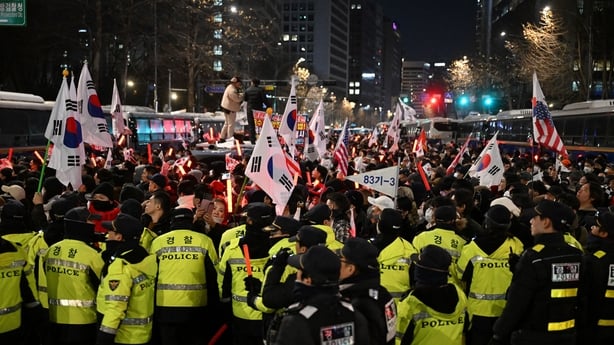South Korea's anti-corruption agency has transferred its case against impeached President Yoon Suk Yeol to prosecutors, recommending his indictment for insurrection and abuse of power over his brief martial law declaration.
The Corruption Investigation Office for High-ranking Officials (CIO) said it would ask prosecutors to indict Mr Yoon over allegations he was the ringleader of an insurrection, for abuse of his authority and obstructing others from exercising their rights.
Mr Yoon, impeached and suspended from power on 14 December, has been incarcerated since last week while investigators probe his 3 December attempt to impose martial law - a move that shocked the nation even though it was overturned within hours by parliament.
The CIO was launched in 2021 as an independent anti-graft agency to investigate high-ranking officials including the president and their family members and has led a joint team involving police and the defence ministry, while prosecutors carry out their own probe.
Under the law, the CIO can only investigate and does not have the authority to prosecute the president and must refer any case to the prosecutors' office for further action.
The CIO has said Mr Yoon's detention is due to end around 28 January, but they expect prosecutors to ask the court to extend it for another 10 days before they formally charge Mr Yoon.
The Supreme Prosecutors' Office declined to comment.
Prosecutors have already charged Mr Yoon's defence minister at the time, Kim Yong-hyun, with insurrection. Chiefs of the Capital Defence Command, the Defence Counterintelligence Command, and the Seoul police and the national police commissioner are also among the officials indicted so far.
Since his arrest on 15 January - the first-ever for a sitting South Korean president - Mr Yoon has refused to speak to CIO investigators and defied their summons.
Lee Jae-seung, deputy chief of the CIO, said it would be more "efficient" for the prosecutors to take over the investigation before indicting Mr Yoon, citing the president's refusal to cooperate.

"Despite the fact that the suspect is under serious allegations that he was ringleader of an insurrection, he continues to be uncooperative to this day, not responding to the criminal justice proceedings and refusing our questioning itself," Mr Lee told a briefing.
He said investigators had obtained testimonies from several military officials on Mr Yoon allegedly trying to arrest politicians and mentioning a second martial law order. Mr Yoon and his lawyers denied these allegations.
Mr Yoon, a top prosecutor before becoming president, now finds his criminal case in the hands of prosecutors from that same world, though how close their current ties are is unclear.
Mr Yoon's lawyers have repeatedly said the CIO has no authority to handle his case as the law stipulates a wide-ranging list of high-ranking officials and violations it can investigate, but has no mention of insurrection.
They also said any criminal investigation should be conducted after the Constitutional Court decides whether to remove Mr Yoon from office in its separate trial on his impeachment.
The lawyers reiterated the position to say they will hold the CIO accountable for what they called its illegal investigation, while asking prosecutors taking over the case t ocomply with the law.
In comments on Tuesday to the Constitutional Court, Mr Yoon denied ordering troops to drag politicians out of parliament or asking the finance minister to prepare a budget for an emergency legislative body.
Insurrection, the crime that Mr Yoon may be charged with, is one of the few that a South Korean president does not have immunity from and is technically punishable by death. South Korea, however, has not executed anyone in nearly 30 years.
Mr Yoon arrived at another Constitutional Court hearing in his impeachment trial this afternoon.
Mr Yoon's lawyers repeated the president's earlier argument that he never intended to fully impose martial law, but had meant the measures as a warning to break political deadlock.
In his first public appearance since attempting suicide in jail last month, former defence minister Mr Kim appeared as a witness at Thursday's hearing and argued that the small number of troops mobilised proved that Yoon was not serious about imposing military control.
Kim acknowledged that he had proposed declaring martial law on 31 December to Yoon, saying the president was concerned and had lamented that the opposition party was obsessed with only three things - protecting the opposition leader from legal liabilities, impeaching government officials and launching special counsel investigations against Mr Yoon.
He quoted Yoon as saying that the opposition's "parliamentary dictatorship and violence had gone out of control" and there was no other way to stop it but declaring emergency martial law.

